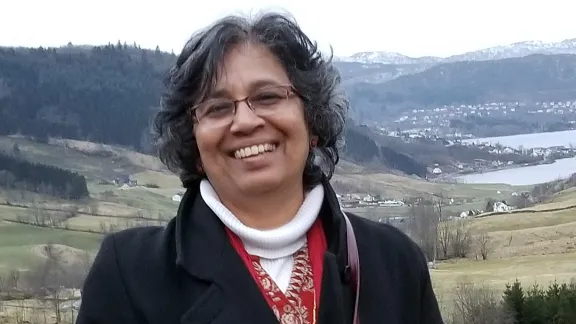
Dr Mary Joy Philip. Photo: Private
A reflection on human responsibility for creation
Bergen, “the heart of the fjords” was the perfect setting for the conference on sustainability and climate in religion.
As we gathered in the Mimes Brønn auditorium of Western Norway University of Applied Sciences, I felt enveloped in the warmth of the surrounding mountains and the gentle touch of weaving fjords. The picturesque wharf and the cobble-stoned pathways told stories of the ebb and flow of life.
The conference presented a venue and an opportunity to bring forth diverse voices on climate change and sustainability, in particular voices that are often forgotten and / or excluded from conversations and collaborations. It is a fact that climate change in its impact, is not proportionate to the ones who contribute to it. It disproportionately affects those that least contribute to it -- the world’s poorest and those in vulnerable situations, especially women and children.
However, despite being more vulnerable to climate change, thankfully, women, like the lotus that blooms in the muddy waters, resist and refuse to give in and instead become agents of change and of environmental justice. Women have an eco-sensitivity and eco-consciousness and see the spirit of wisdom as the healing and life-giving force. In their role as bearers of human life and primary care givers they combine the sacred inherent in the natural world like trees, plants and water with understanding, thereby developing an eco-theology which undergirds their practice.
Earth consciousness
The ecological crisis that we face now is nothing but a reflection of the crises we face in our own lives, and in our psyche, especially with regard to the earth. I was reminded of John Darrel DesRoches’ research on humanity’s earth consciousness, where he says that this crisis is because our relationship with the earth and the universe has largely been shaped by stories of dominion, and I think he is right.
If our stories of earth come from the perspective of dominion then our attitude towards the earth will be one of dominion, to subdue it. If our stories of earth are of connectedness then our response will be relational. Climate change calls us and provokes our humanity to question and challenge traditional perceptions of our relationships with earth and, by extension, our relationships with each other and with God. It challenges us to envision a single theological climate in which, how we relate to one feeds back into our relationships with the others.
Web of life
We have to remember that the earth and her earthlings are intimately connected; we are all interconnected from the smallest atom to the blue whales to the redwood trees to the butterflies, to the mountain peaks to the oceans and what affects one affects us all. As Rachel Carson said, “in every grain of sand there is the story of the earth.” We are called to listen to the voice of the earth and pay heed to her stories.
Along with DesRoches, I firmly believe that we desperately need new stories born out of an earth consciousness, a relational and embodied understanding of ourselves vis-à-vis the earth; we need a re-storying about the earth that includes our interconnectedness with the planet and the re-storying needs to start now.
Dr Mary Philip (a.k.a Joy) is Associate Professor of Lutheran Global Theology and Mission and director of the Master of Divinity Program at the Martin Luther University College in Waterloo, Ontario, Canada. She was one of the LWF representatives at the conference on sustainability and climate in religion.


